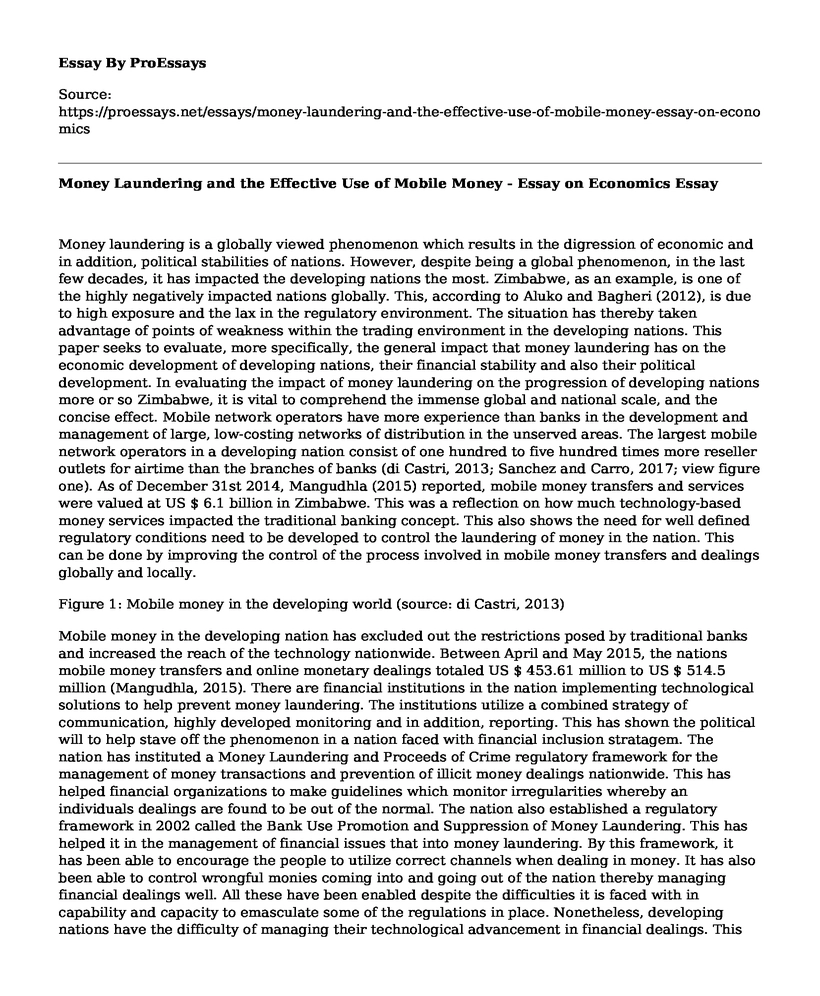Money laundering is a globally viewed phenomenon which results in the digression of economic and in addition, political stabilities of nations. However, despite being a global phenomenon, in the last few decades, it has impacted the developing nations the most. Zimbabwe, as an example, is one of the highly negatively impacted nations globally. This, according to Aluko and Bagheri (2012), is due to high exposure and the lax in the regulatory environment. The situation has thereby taken advantage of points of weakness within the trading environment in the developing nations. This paper seeks to evaluate, more specifically, the general impact that money laundering has on the economic development of developing nations, their financial stability and also their political development. In evaluating the impact of money laundering on the progression of developing nations more or so Zimbabwe, it is vital to comprehend the immense global and national scale, and the concise effect. Mobile network operators have more experience than banks in the development and management of large, low-costing networks of distribution in the unserved areas. The largest mobile network operators in a developing nation consist of one hundred to five hundred times more reseller outlets for airtime than the branches of banks (di Castri, 2013; Sanchez and Carro, 2017; view figure one). As of December 31st 2014, Mangudhla (2015) reported, mobile money transfers and services were valued at US $ 6.1 billion in Zimbabwe. This was a reflection on how much technology-based money services impacted the traditional banking concept. This also shows the need for well defined regulatory conditions need to be developed to control the laundering of money in the nation. This can be done by improving the control of the process involved in mobile money transfers and dealings globally and locally.
Figure 1: Mobile money in the developing world (source: di Castri, 2013)
Mobile money in the developing nation has excluded out the restrictions posed by traditional banks and increased the reach of the technology nationwide. Between April and May 2015, the nations mobile money transfers and online monetary dealings totaled US $ 453.61 million to US $ 514.5 million (Mangudhla, 2015). There are financial institutions in the nation implementing technological solutions to help prevent money laundering. The institutions utilize a combined strategy of communication, highly developed monitoring and in addition, reporting. This has shown the political will to help stave off the phenomenon in a nation faced with financial inclusion stratagem. The nation has instituted a Money Laundering and Proceeds of Crime regulatory framework for the management of money transactions and prevention of illicit money dealings nationwide. This has helped financial organizations to make guidelines which monitor irregularities whereby an individuals dealings are found to be out of the normal. The nation also established a regulatory framework in 2002 called the Bank Use Promotion and Suppression of Money Laundering. This has helped it in the management of financial issues that into money laundering. By this framework, it has been able to encourage the people to utilize correct channels when dealing in money. It has also been able to control wrongful monies coming into and going out of the nation thereby managing financial dealings well. All these have been enabled despite the difficulties it is faced with in capability and capacity to emasculate some of the regulations in place. Nonetheless, developing nations have the difficulty of managing their technological advancement in financial dealings. This means that they rely on political goodwill and the support of the developed nations to help prevent illicit dealings. This ensures that their economies are not negatively impacted by such trading.
References
Aluko, A. and Bagheri, M. (2012). The impact of money laundering on economic and financial stability and on political development in developing countries: The case of Nigeria, Journal of Money Laundering Control, Vol. 15 Issue: 4, pp.442-457, https://doi.org/10.1108/13685201211266024
di Castri, S. (2013). Mobile money: enabling regulatory solutions. Accessed [2017/6/12] <https://www.gsma.com/publicpolicy/wp-content/uploads/2013/02/GSMA2013_Report_Mobile-Money-EnablingRegulatorySolutions.pdf>
Mangudhla, T. (2015 May 5). Banks under mobile money pressure, The Independent. Accessed [2017/6/12] <https://www.theindependent.co.zw/2015/07/31/banks-under-mobile-money-pressure/>
Sanchez, A., & Carro, B. (2017). Emerging Markets: Mobile Money for the Unbanked. Digital Services in the 21st Century: A Strategic and Business Perspective, 117-142.
Cite this page
Money Laundering and the Effective Use of Mobile Money - Essay on Economics. (2021, Jun 23). Retrieved from https://proessays.net/essays/money-laundering-and-the-effective-use-of-mobile-money-essay-on-economics
If you are the original author of this essay and no longer wish to have it published on the ProEssays website, please click below to request its removal:
- Mario Barrera: Colonial Labor System - Research Paper
- Save the Children's Foundation - Research Paper
- DHS Homeland Security Intelligence Center Essay Example
- Economics of Capitalism Essay
- Paper Sample on Immigration to the U.S.: Detention and Discrimination of Foreigners
- Free Report Example on US Labor Market Begins Recovery: 4.8M Jobs Added in June
- COVID-19 and Prison System - Report Example







